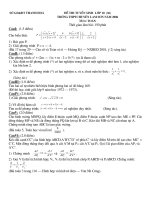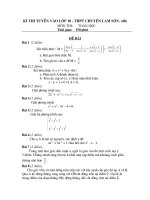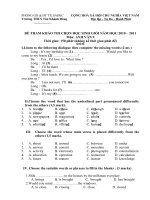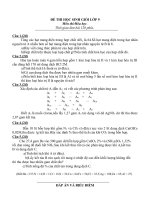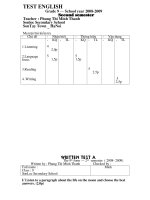100 đề luyện thi HSG tiếng anh 9 có đáp án đề 21
Bạn đang xem bản rút gọn của tài liệu. Xem và tải ngay bản đầy đủ của tài liệu tại đây (200.34 KB, 7 trang )
ENGLISH PRACTICE 11
II. Grammar and reading:
Part 1: Use the correct form of the verbs in brackets to complete the sentences below (1.0 p)
1. By the time the police arrived, the two men (disappear) ……………………………….
2. I look forward to (hear) ………………………......………. from you as soon as possible.
3. She looks as if he (be) ……………………….........…………. from another planet.
4. Each of these four brothers (be) ………………….....………… very different from others.
5. Why do you keep looking back? Are you afraid of (follow) ….....…...........……………………?
6. Should Mr. George have money, he (buy)............................................................ a new
dictionary.
7. Our classmates couldn’t help (laugh) …............................when they heard the teacher’s funny
story.
8. This kitchen needs (repair) …………………….......................………… as quickly as possible.
9. If they had revised the lessons carefully, they ( not/fail) ……...................…….....…… the
exam.
10. I would rather (not/watch) ……….........……...………....………… television.
Part 2: Fill in each gap in each sentence with the correct form of the word in brackets (1.0 p)
1. I really don’t think he has the ….…. to do this job.
(able)
2. The professor explained his idea with great ……….
(clear)
3. He seemed to be quite ……... about the future. He looks very disappointed. (hope)
4. The ending of the detective novel seems …….… improbable.
(high)
5. They felt …….. with her performance.
( disappoint)
6. Mr. Smith builds a wall to .......people from stealing fruits
(courage)
7. Electric devices help reduce fuel.....
(consume)
8. It is their ........to ensure that the rules are enforced
(responsible)
9. The health of our children is being ...........by exhaust fumes
(danger)
10. Teacher asks him to select one of ............and give a report on it
(occupy)
Your answers:
1.
6.
2.
7.
3.
8.
4.
9.
5.
10.
Part 3: Choose the best answer (a, b, c or d) (3.0 p)
1. Helen has …............ ability that everyone is jealous of her.
A. such exceptional
B. so exceptional
C. such an exceptional
D. so unexceptional
2. We hate flying because planes …........… too much noise.
A. cause
B. make
C. have
D. are
3. Jane lives in the house …....... the green door.
A. which is
B. whose has
C. where has
D. with
4. There are some people who always …........ trouble.
A. create
B. cause
C. make
D. produce
5. I didn’t realize you are a foreigner. Your ……. of English is very good .
A. knowledge
B. quality
C. skill
D. speech
Page 0/5
6. We’d better start early …..............…there is a lot of traffic.
A. so that
B. so
C. therefore
D. in case
7. The mass of insects on Earth is …...…. all other land animals combined.
A. greater than that of B. as large as
C. more greater
D. broader than the one of
8. . ….... from Bill, all the students said they would go.
A. Except
B. Only
C. Apart
D. Separate
9. Customers nowadays look for products that are …....…. friendly.
A. environmentalist
B. environmentally C. environmentedly D. environment
10. What beautiful eyes…....…!
A.does she have
B. she has
C. has she
D. she doesn’t have
11. Make exercise a part of your daily…...…
A.regularity
B. chore
C. routine
D.frequence
12. Only after food has been dried or canned ….......… later consumption.
A. that it should be stored for
B. it should be stored for
C. should it be stored for
D. should be stored for
13. Heavy rains and floods …........… all trains.
A. have delayed
B. have cancelled C. has been postponed D.all are correct
14. Not until the monkey is several years old …....... to exhibit signs of independence from its mother
A. it begins
B. does it begin
C. did it begin
D. it began
15. He demanded that he …........... allowed to meet his lawyer.
A. were
B. would had been C. is
D. be
Part 4: Fill Only One suitable word in the gap (3.0 p).
Where do we get the news ?
Information about what has happened in the world, in our country, in our area, or even in
our town comes to us in many ways. People who can read often get their (1).......................from
(2)
.......................... . because many people in the world are illiterate, however, they have to get
the news from (3) ...............................or (4) .....................
Newspapers around the world are similar in many ways. They all (5) ........................news,
stories that tell readers about the events of the day or week. Most newspapers include
editorials that give the (6) ............................of the government or of the newspaper’s
publishers.
Often papers have other (7) ...............................that are devoted to business, sports and
maybe the latest fashion news. Papers usually appear (8) .................................or everyday, but
in some places they may only appear (9) ..................................
(10)
.................................. are another way that some people get the news. Magazines are
longer and usually appear (11)................................ . (12) ....................................and
(13)
................................. are two other sources of news. They get the news out faster than
newspapers and magazines, and they don’t have to be read. Radio and television stations (14)
(15)
........................................... the news several
........................each day.
Part 5: Read this text. If you find a mistake in a line, cross it out and suggest an alternative.
If there is no mistake, put a tick (). The first two have been done for you (2.0 p).
I love travelling on any vehicle that goes fastly.
The Bullet Train in Japan is very fast indeed!
0
0
It is so smooth, you hardly notice its speed.
It is extremely punctual, but if it arrives lately,
you can get your money back. You can see very good
out of the train windows and admire Mount Fujiyama.
Some people take it easy and enjoy the trip,
eating a meal slow, while the train moves
1
2
3
4
5
6
fast
Page 1/5
quick across the country. Others like to work
hard before they get to the office.
The train is highly regarded throughout the world.
A ride on the Bullet Train really is an experience.
Part 6: Read the passage and choose the best answer (1.0 p).
7
8
9
10
WTO
The World Trade Organization (WTO) has 150 member countries. They are looking to
improve trade. Trade means the buying and selling of goods. The WTO provides a place
where these countries can talk about what they need. The goal of the WTO is to make trade
grow by removing legal barriers between countries.
The WTO helps trade in several ways. First, it asks countries to treat each other equally. They
should not give special trade deals to one country and not to another. Also, these countries should not
try to stop foreign products from any one country. The idea is that goods and services should be able
to cross borders easily. A second way to improve trade is to lower tariffs. These are special taxes for
things bought and sold. A third way to strengthen trade is to make sure that he rulers will stay the
same. In order for people to invest their money, they need to feel secure for the future. A fourth way is
to allow greater competition between countries. The central belief is that competition makes for a
stronger economy. The last way to improve trade is to help countries that are poor. They need help
coming up to the level of modern countries. They can be helped by allowing them extra time to get
their systems in order. They can be given priority in making deals with other countries.
Free and easy trade is the WTO's goal. It supports rich countries and helps poor
countries get ahead. It is one way of improving the lives of more people in the world. It asks
countries to make laws that help this process. Every year, more countries apply to be in the
WTO. They see membership as a good thing.
1. Paragraph 2 lists the ways in which the WTO helps trade. How many ways are mentioned?
A. 6
B. 5
C. 3
D. 4
2. Which of the following does NOT support the idea that the WTO provide a way for
countries to improve trade?
A. Countries should allow goods and services to cross border easily
B. Countries should lower tariffs and make investors feel secure
C. Countries should be fair to one another and help poor members
D. Countries should allow time to raise taxes
3. Why does the author give details about how the WTO helps trade?
A. To promote discussion about the WTO
B. To distinguish between the WTO and banks
C. To complain about the actions of the WTO
D. To illustrate how the WTO improves international trade
4. According to the passage, all of the following are true except:
A. Trade means the buying and selling of goods
B. The WTO wants to make trade better
C. The WTO wants to improve trade by lowering taxes
D. Poor countries are not given priority
5. According to paragraph 3, the WTO……………
A. helps improve the lives of more people in the world.
B. asks rich countries to help poor countries
C. helps rich countries get ahead
D. gives poor countries lots of food
.
III. writing: (5,0 points)
Part 1: Use the words in brackets to combine these sentences.
Page 2/5
1. Perhaps you will arrive at your hotel before 5 o’clock. In that case please telephone me at my office.
(if)
…………........………………………………………................................................………………………………............................................……………
…………........………................................................………………………………………………………………............................................……………
2. I will leave a message for you with my secretary. It is possible that I will be out when you
telephone. (in case)
…………........………………………………………................................................………………………………............................................……………
…………........………................................................………………………………………………………………............................................……………
3. I will discuss your programme with you. Do not make any appointments before that. (before)
…………........………………………………………................................................………………………………............................................……………
…………........………................................................………………………………………………………………............................................……………
4. He arrived home. Immediately he turned on the computer. (No sooner …....…. than)
…………........………………………………………................................................………………………………............................................……………
…………........………................................................………………………………………………………………............................................……………
5. I caught the early bus. I didn’t want to have to rush. (so as)
…………........………………………………………................................................………………………………............................................……………
Part 2: For each of the sentences below, write a new sentence as similar as possible in
meaning to the original sentence.
1. The questions were so easy that all the students got them right.
They were ……………..…………………....………………………………………………
2. You are not permitted to smoke in the cinema.
Smoking…………………....………....………………………………………………………
3. I wish I had gone on holiday with you.
I regret ……....…………………………......…………………………………………………
4. I asked Mrs. Helen “Did you see him here yesterday ?”
I asked ..….......……………………………....………………………………………………
5. Mr. Smith didn’t go on business because of the bad weather
If ...................................................................................................................................................
Part 3: Write a paragraph about environmental pollution and sollutions to it. (about 100 words)
(ThÝ sinh viÕt Part 3 vµo bµi thi nµy)
.................................................................................................................................................
.......................................
..........................................................................................................................................................
..........................................
..........................................................................................................................................................
..........................................
..........................................................................................................................................................
..........................................
Page 3/5
..........................................................................................................................................................
..........................................
..........................................................................................................................................................
..........................................
..........................................................................................................................................................
..........................................
..........................................................................................................................................................
..........................................
..........................................................................................................................................................
..........................................
..........................................................................................................................................................
..........................................
..........................................................................................................................................................
..........................................
Page 4/5
KEYS
II. Grammar and reading: 12,0 điểm.
Part 1: 10 câu: 1,0 điểm. Mỗi câu đúng 0,1 điểm.
1. had disappeared 2. hearing
3. were
4. is
5. being followed
8. to be repaired/
7. laughing
9. wouldn’t have failed 10. not watch
repairing
6. will buy
Part 2: 10 c©u:
1. ability
5. disappointed
9. endangered
1,0 điểm. Mỗi câu đúng 0,1 điểm.
2. clarity/clearness
3. hopeless
4. highly
6. discourage
7. consumption
8. responsibility
10. occupations
Part 3: 15 câu: 3,0 điểm. Mỗi câu đúng 0,2 điểm.
1. C
7. A
13. A
2. B
8. C
14. C
3. D
9. B
15. D
4. C
10. B
5. A
11. C
6. D
12. C
Part 4: 15 câu: 3,0 điểm. Mỗi câu đúng 0,2 điểm.
1. news
5. have
9. monthly
13. T.V (television)
2. newspaper
6. views
10. Magazines
14. broadcast
3. radio
7. pages
11. weekly
15 times
4. television
8. weekly
12. radio
Part 5: 2,0 điểm. Mỗi câu đúng 0,2 điểm. 0. fastly fast
1.
2. lately late
3. good well
6. slow slowly
7. quick quickly
8.
4.
9.
0.
5.
10.
Part 6: 2,0 điểm. Mỗi câu đúng 0,4 điểm.
1.B
2. D
3. d
4. d
5. a
III. Writing: 5,0 điểm.
Part 1: 1,0 điểm. Mỗi câu đúng 0,2 điểm.
1. If you arrive at your hotel before 5 o’clock, please telephone me at my office.
2. I will leave a message for you with my secretary in case I am out when you telephone.
3. Before I discuss your programme with you, do not make any appoints.
4. No sooner had he arrived home than he returned on the computer.
5. I caught the early bus so as not to have to rush.
Part 2: 1,0 điểm. Mỗi câu đúng 0,2 điểm.
1. They were such easy questions that all the students got them right.
2. Smoking is prohibited / not permitted / not allowed/ ... in the cinema.
3. I regret not having gone / not going on holiday with you.
Page 5/5
4. I asked Mrs. Helen If (whether) she had seen him there the day before.
Part 3: 3,0 ®iĨm.
Häc sinh viÕt thành đoạn văn hoàn chỉnh (có mở bài, thân bài
và kết luận). Nêu đợc sự ô nhiễm môi trờng và nêu ra đợc một số
giải pháp để khắc phục, giảm bớt sự ô nhiễm. Thí sinh viết đúng
chủ đề, nội dung phong phú, viết đúng ngữ pháp, sử dụng nhiều
mẫu câu đà học, dùng từ chuẩn xác, đoạn văn không quá ngắn.
( khoảng 100 từ) không mắc lỗi sai ngữ pháp đợc điểm tối đa.
* Yờu cu ca bi vit:
1. Học sinh viết đúng kết cấu một đoạn văn (bao gồm: topic sentence, supporting ideas
and conclusion): 0,5 điểm.
2. ý tưởng, dẫn chứng rõ ràng, cụ thể và có sức thuyết phục: 1,0 điểm.
3. Dùng từ chính xác, phù hợp: 0,5 điểm.
4. Viết câu đúng (câu phải đúng ngữ pháp, câu không quá dài, sử dụng dấu câu đúng): 0,5
điểm
5. Sắp xếp, trình bày các ý theo trật tự đúng (Ví dụ: từ ý quan trọng nhất đến ý ít quan
trọng nhất hoặc ngược lại): 0,5 điểm.
____________________________________________
Làm trịn điểm: (Ví dụ) 15,1 15,0
15,4; 15,6 15,5
/ 15,2; 15,3 15,25
/ 15,7; 15,8 15,75
/ 15,9 16,0
Page 6/5
